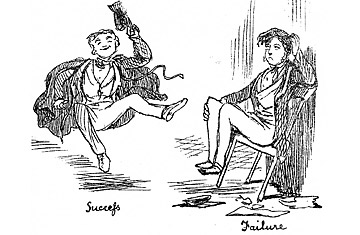
An illustration from the book An American In Victorian Cambridge: Charles Astor Bristed's "Five Years in An English University."
With its medieval architecture, well-manicured greens and charming wooden punts, Cambridge University is renowned for its beauty as well as its academic rigor. Yet for one visiting American in the 19th century, the elegant surface of Victorian Cambridge masked a culture of debauchery where students indulged in heavy drinking and solicited prostitutes in between jaunts to the library.
"There is a careless and undisguised way of talking about gross vice," Charles Astor Bristed wrote of the attitude among his classmates in his diary, first published in 1852. "It is talked of as a thing which is on the whole natural, excusable and, perhaps, to most men necessary."
Bristed, the son of America's first multi-millionaire, penned the diary while he was studying classics at Cambridge in the 1840s. Now, for the first time in more than a century, his work is being republished in An American In Victorian Cambridge: Charles Astor Bristed's "Five Years in An English University." His rich account of Cambridge's devil-may-care student life is part memoir, part instructional guide: it offers tips on navigating the city's twisting streets and preparing for the university's notoriously difficult exams, while also divulging how students weaseled their way out of them. (See TIME's Top 10 non-fiction books of the year.)
"He explains Cambridge in great detail because he knows his American readers won't have the faintest idea of how England works," says Christopher Stray, a professor of classics at England's Swansea University and the man responsible for the reprinting of the book, published in the U.S. on Dec. 19.
As Bristed puts Cambridge under the microscope, he also reveals his refined tastes as a New York City socialite. A connoisseur of fine food and wine, he was revolted by British cuisine, particularly the ever-present mutton chop served with potatoes and gravy. He always purchased the latest fashions in London's tony neighborhood of Mayfair and was outraged by his less stylish classmates.
Most shocking to Bristed, however, was the acceptance of immoral behavior by British undergraduates. New acquaintances, he wrote, found nothing unusual about inviting him along to brothels in Barnwell, a village notorious for its sex trade: "He had not known me two days before he asked me to accompany him to Barnwell on an evening after Hall, just as quietly as a compatriot might have asked me to take a drink." The ease with which his peers exploited women reflected their view that "a shop girl, work-woman, domestic servant, and all females in similar positions, were expressly designed for the amusement of gentlemen, and generally serve that purpose."
Given that only "frigid, highly religious" students avoided Cambridge's vices, Bristed endeavored to engage with his peers in sin. In one humorous passage he explains how he created the illusion that he enjoyed the incessant flow of alcohol as much as his classmates did: "The colored glass enabled me to fill and empty, in appearance, many times, while in reality I only poured out and tasted a few drops." (See pictures of the Oxford and Cambridge University Boat Race.)
For many Americans studying in Britain today, the Victorian penchant for drunken revelry still colors higher education in the U.K. The decision to study abroad often involves a desire to partake in Britain's lively pub culture and take advantage of the lower drinking age of 18. Some also believe that universities in Britain are simply easier than those in the States. It's a common joke among American students that LSE, the initials for the London School of Economics, one of Britain's most esteemed universities, stand for "Let's See Europe," because they think the courses are less rigorous than at U.S. institutions, thereby allowing time to visit the Continent.
But while Bristed was taken aback by the boozing at Cambridge, in his diary he praised the academic virtues and well roundedness of the students. Maybe he was right and things at the university really have changed for the worse. Or maybe he was just full of hot air. Professor Stray, who came across the diary in a Cambridge library 20 years ago, spent seven years adding notes to the text, and his efforts, in part, have saved the book from oblivion. But for all his investment in Bristed's work, he still can't stomach the author's egotism and occasional haughtiness. "He's someone I would have enjoyed having a glass of wine with," Stray says, "but over a few months he would have grown tiresome." Fortunately, An American in Victorian Cambridge, like Bristed himself, can be enjoyed in moderation.
